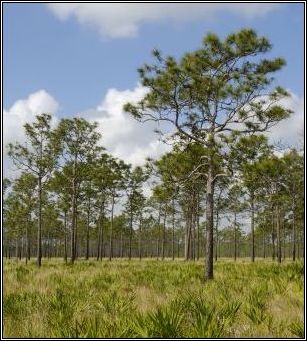The Florida Forest Service (FFS) and Florida Natural Areas Inventory (FNAI) have partnered to develop the Longleaf Pine Ecosystem Geodatabase (LPEGDB), a spatial database that will serve as the central repository for data on the distribution and ecological condition of longleaf pine ecosystems (LPE) in Florida. The database includes data provided by many partner agencies and organizations as well as new field assessment data collected for this project.
The LPEGDB represents a major step toward fulfilling inventory and assessment objectives of Florida's Forest Action Plan and the America's Longleaf 2009 Range-wide Conservation Plan for Longleaf, and ultimately should provide decision support for where and how to accomplish goals for conservation, restoration, and management of LPEs. FNAI and FFS will continue to enhance, improve, and update the LPEGDB along with related tools and maps as funding allows.
Longleaf pine ecosystems are among the most diverse in North America, supporting a large array of herbs and grasses as well as rare animal species such as red-cockaded woodpeckers and gopher tortoises. Although longleaf forests and savannas once dominated the southeastern coastal plain, they have been drastically reduced from an estimated 90 million acres to a current estimate of 5.2 million, largely due to urbanization, over-utilization, conversion to other land uses, and exclusion of natural fire regimes.
Much of the remaining acreage exists as fragmented stands in varying degrees of isolation. Recently, however, many organizations and agencies have taken steps to prevent further loss, improve what's left, and restore the longleaf pine ecosystem where practicable. The LPEGDB contributes to this effort by providing detailed, baseline data on the location and current ecological condition of remaining longleaf sites in Florida.

Click to view and interact with map layers related to longleaf pine occurrence and condition
Version 5 includes a major update for public lands, with data provided primarily by partners from many agencies and organizations, including data from recent FNAI field projects.
Version 4 includes a major update based on a second phase of rapid assessment by Florida Forest Service County Foresters, which focused primarily on planted longleaf. Additional updates were based on new FNAI field projects and updates from partner data sources.
Version 3 includes updates based on FNAI field projects and several partner data sources. Attributes and summaries for conservation lands and land cover were added and the database format was revised. The Rapid Assessment Data Collection Model was also updated and field data collection tools are available upon request.
Version 2 fills several known remaining data gaps on managed conservation lands, especially gaps in ecological condition of LPEs. Updates are included for lands managed by Florida Forest Service, Eglin AFB, U. S. Forest Service, St. Johns River WMD, as well as several non-NRCS-funded longleaf plantings on private lands.
This version corresponds to the LPEGDB Final Report and represents all tasks involved in the initial development of the database, including compilation of potential LPEs, extensive mining of existing assessment data, and the Rapid Assessment of more than 800,000 acres of LPEs by FFS.
This report describes a major update to the LPEGDB, primarily for public lands but including several new sources from local land trusts. In addition, the attributes in this version are now aligned with the SE LEO GDB. PDF (1.9 MB)
This report describes a major update to the LPEGDB, including new rapid assessment data collection, a revised crosswalk of condition data into management levels, and final results. PDF (29.8 MB)
This report is supplementary to the Final Report. It describes the latest updates to longleaf data, database format, and the Rapid Assessment Data Collection Model. Acreage summaries by manager type, land cover type, and county are included. PDF (15.7 MB)
This report is supplementary to the Final Report. It describes a number of data updates and summarizes feedback and recommendations received from longleaf partners at a meeting held to review the LPEGDB. PDF (931 KB)
This report describes development of LPEGDB v.1, including database design, rapid assessment protocol, crosswalk of condition data into management levels, and initial results. PDF (9.4 MB)
To access the LPEGDB statewide File Geodatabase please contact the State Forest Ecologist (email).
Longleaf Documentary
For technical data questions:
Florida Natural Areas Inventory
(850) 224-8207 x214
Amy Knight, GIS Program Specialist
Email: Amy Knight
For program questions and data license agreements:
Florida Department of Agriculture and Consumer Services
Florida Forest Service
Forest Management Bureau
(850) 681-5885
Mark Kiser, State Forest Ecologist
Mark.Kiser@FDACS.gov